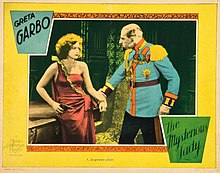
The Hollywood Revue of 1929, or simply The Hollywood Revue, is a 1929 American pre-Code musical comedy film released by Metro-Goldwyn-Mayer. It was the studio's second feature-length musical, and one of their earliest sound films. Produced by Harry Rapf and Irving Thalberg and directed by Charles Reisner, it features nearly all of MGM's stars in a two-hour revue that includes three segments in Technicolor. The masters of ceremonies are Conrad Nagel and Jack Benny.

Greta Garbo was a Swedish-American actress and a premier star during Hollywood's silent and early golden eras. Regarded as one of the greatest screen actresses of all time, she was known for her melancholic and somber screen persona, her film portrayals of tragic characters, and her subtle and understated performances. In 1999, the American Film Institute ranked Garbo fifth on its list of the greatest female stars of classic Hollywood cinema.

William H. Daniels ASC was a film cinematographer who was best-known as actress Greta Garbo's personal lensman. Daniels served as the cinematographer on all but three of Garbo's films during her tenure at Metro-Goldwyn-Mayer, including Torrent (1926), The Mysterious Lady (1928), The Kiss (1929), Anna Christie (1930), Grand Hotel (1932), Queen Christina (1933), Anna Karenina (1935), Camille (1936) and Ninotchka (1939). Early in his career, Daniels worked regularly with director Erich von Stroheim, providing cinematography for such films as The Devil's Pass Key (1920) and Greed (1924). Daniels went on to win an Academy Award for Best Cinematography for his work on The Naked City (1948).
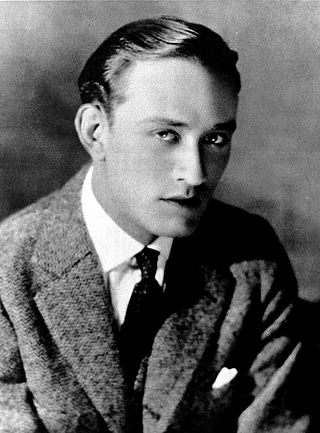
John Conrad Nagel was an American film, stage, television and radio actor. He was considered a famous matinée idol and leading man of the 1920s and 1930s. He was given an Honorary Academy Award in 1940, and three stars on the Hollywood Walk of Fame in 1960.
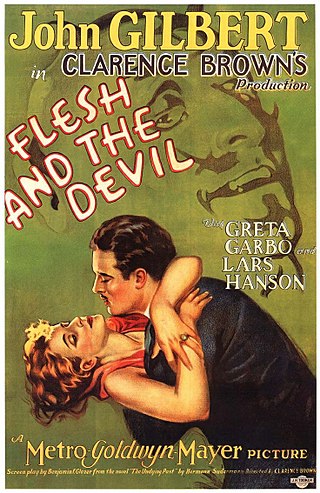
Flesh and the Devil is an American silent romantic drama film released in 1926 by Metro-Goldwyn-Mayer and stars Greta Garbo, John Gilbert, Lars Hanson, and Barbara Kent, directed by Clarence Brown, and based on the novel The Undying Past by Hermann Sudermann.

The Student Prince in Old Heidelberg, also known as The Student Prince and Old Heidelberg, is a 1927 Metro-Goldwyn-Mayer silent drama film based on the 1901 play Old Heidelberg by Wilhelm Meyer-Förster. It was directed by Ernst Lubitsch, and stars Ramon Novarro and Norma Shearer.
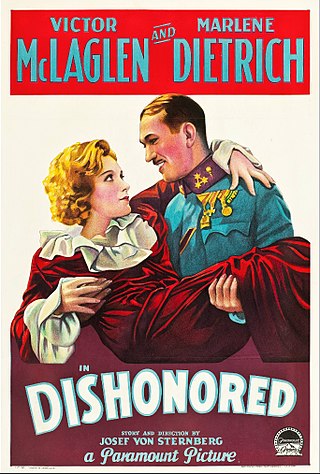
Dishonored is a 1931 American pre-Code romantic spy film directed and edited by Josef von Sternberg, who also co-wrote the film with Daniel N. Rubin. It was produced and distributed by Paramount Pictures. The film stars Marlene Dietrich, Victor McLaglen, Gustav von Seyffertitz, and Warner Oland, and follows a female spy (Dietrich) for Austria-Hungary during World War I. Costume design was provided by Travis Banton, in one of his several collaborations with Dietrich.

Anna Karenina is a 1935 Metro-Goldwyn-Mayer film adaptation of the 1877 novel Anna Karenina by Leo Tolstoy and directed by Clarence Brown. The film stars Greta Garbo, Fredric March, Basil Rathbone, and Maureen O'Sullivan. There are several other film adaptations of the novel.

Love is a 1927 American silent drama film directed by Edmund Goulding and released by Metro-Goldwyn-Mayer. A sound version of the film was released in 1928 with a synchronized musical score with sound effects. MGM made the film to capitalize on its winning romantic team of Greta Garbo and John Gilbert who had starred in the 1926 blockbuster Flesh and the Devil.

Torrent is a 1926 American silent romantic drama film directed by an uncredited Monta Bell, based on a novel by Vicente Blasco Ibáñez, and released on February 21, 1926. Torrent was the first American film starring Swedish actress Greta Garbo. The film also starred Ricardo Cortez and Martha Mattox.

The Only Thing is a 1925 American silent romantic drama film starring Eleanor Boardman. The film's scenario was written by author Elinor Glyn, and was based on a story adapted from Glyn's novel of the same name.

Gustav von Seyffertitz was a German film actor and director. He settled in the United States. He was born in Haimhausen, Bavaria, and died in Los Angeles, California, aged 81.
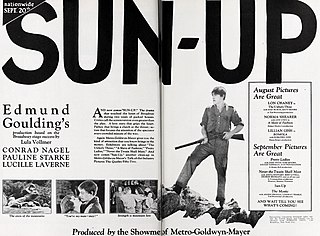
Sun-Up is a 1925 American silent drama film directed by Edmund Goulding based upon a successful 1924 play of the same name by Lula Vollmer. The film stars Lucille La Verne, replaying her successful New York stage role, Pauline Starke, and Conrad Nagel.
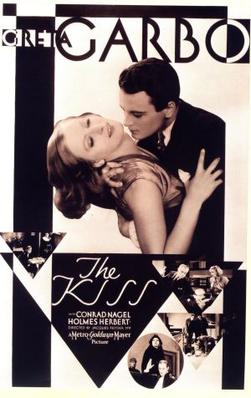
The Kiss is a 1929 American synchronized sound drama film directed by Jacques Feyder, starring Greta Garbo, Conrad Nagel, and Lew Ayres in his first feature film. The film has no audible dialogue but featured a synchronized musical score and sound effects. The soundtrack was recorded using the Western Electric Sound System sound-on-film process. The soundtrack was also transferred to discs for those theatres that were wired with sound-on-disc sound systems.

The Single Standard is a 1929 American synchronized sound romantic drama film from Metro-Goldwyn-Mayer directed by veteran John S. Robertson and starring Greta Garbo, Nils Asther and Johnny Mack Brown. The film has no audible dialogue but featured a synchronized musical score and sound effects. The soundtrack was recorded using the Western Electric Sound System sound-on-film process. The soundtrack was also transferred to discs for those theatres that were wired with sound-on-disc sound systems.
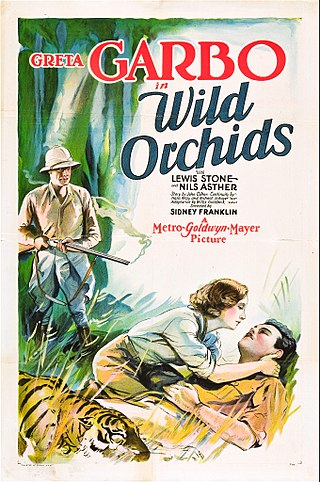
Wild Orchids is a 1929 American synchronized sound drama film from Metro-Goldwyn-Mayer directed by Sidney Franklin and starring Greta Garbo, Lewis Stone and Nils Asther. Only these three stars received cast credit. While the film has no audible dialog, it was released with a synchronized musical score with sound effects using both the sound-on-disc and sound-on-film process. The plot is very similar to Garbo's later sound film, The Painted Veil (1934).
Clarence Sinclair Bull was a portrait photographer who worked for movie studios during the Golden Age of Hollywood. He was head of the Metro-Goldwyn-Mayer stills department for nearly 40 years.

Unseeing Eyes is a lost 1923 American silent north country drama film produced by William Randolph Hearst and distributed by Goldwyn Pictures. Edward H. Griffith directed Lionel Barrymore, Seena Owen, Louis Wolheim, and Gustav von Seyffertitz in the action packed drama. The movie was filmed in part at the Gray Rocks Resort in the Laurentian Mountains of Quebec, Canada.
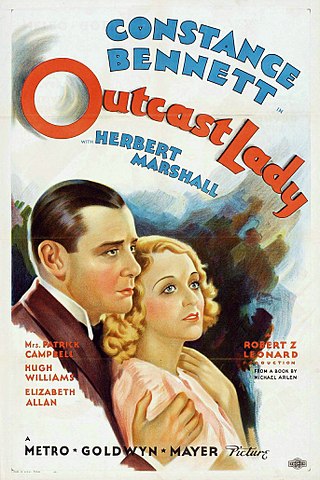
Outcast Lady is a 1934 American romantic drama film directed by Robert Z. Leonard and produced and distributed by Metro Goldwyn Mayer. The film stars Constance Bennett, Herbert Marshall and Mrs. Patrick Campbell. It is a sound version of Michael Arlen's 1924 novel The Green Hat, filmed in 1928 by MGM as A Woman of Affairs with Greta Garbo and John Gilbert.

Princess Jones is a 1921 American silent comedy film directed by Gustav von Seyffertitz and starring Alice Calhoun, Vincent Coleman and Helen Dubois.
